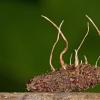
18-06-2017 19:42
 Angel Pintos
Angel Pintos
Hi everyone, does anyone know if Hysterium spp hap

16-06-2017 08:17
 Kestutis Grigaliunas
Kestutis Grigaliunas
Bonjour,Last week I took samples from dying branch

14-06-2017 20:48
I'm a bit unsure whether that is S. heterosphaera.

10-06-2017 08:07
 Viktorie Halasu
Viktorie Halasu
Hello forum,I was given this Otidea from last augu
Hirsutella?
Dragiša Savic,
19-10-2015 14:27
Does anyone have this paper
Liang ZQ. 1990b. Classification of the genus Hirsutella Pat. II. Key of species to the genus Hirsutella Pat. Southwest China Journal of Agricultural Sciences 3: 32–39.
Martin Bemmann,
19-10-2015 14:38

Re : Hirsutella?
Dear Dragisa,
I could send it to you. But the paper is completely in Chinese.... ;-)
Regards
Martin
I could send it to you. But the paper is completely in Chinese.... ;-)
Regards
Martin
Dragiša Savic,
19-10-2015 14:43
Re : Hirsutella?
Oh, do not, I do not speak Chinese.
Thanks anyway
Thanks anyway
Nicolas VAN VOOREN,
19-10-2015 18:58

Re : Hirsutella?
It would be important to examine the conidiogeneous apparatus to check if this belongs to the genus Hirsutella or another anamorphic genus (e.g. Hymenostilbe).
Thorben Hülsewig,
20-06-2017 21:24
Re : Hirsutella?
Hallo Martin,
kannst du mir den Artikel vielleicht auch schicken ?
Vielen Dank im voraus.
Viele Grüße
Thorben
kannst du mir den Artikel vielleicht auch schicken ?
Vielen Dank im voraus.
Viele Grüße
Thorben


